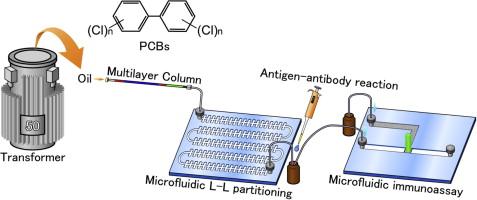Screening of polychlorinated biphenyls in insulating oil using a microfluidic based pretreatment and immunoassay
Abstract
Polychlorinated biphenyls (PCBs) are persistent organic pollutants in insulating oil of a large number of transformers. A rapid and economical analytical method to detect PCB contamination is still required. To address this issue, we propose here the first microfluidic screening method for PCB contamination in insulating oil. The insulating oil was pretreated using a multilayer capillary column and a microfluidic liquid–liquid partitioning. PCBs in the pretreated oil were measured using a microfluidic kinetic exclusion assay. In order to detect PCBs with high sensitivity, conditions of the microfluidic kinetic exclusion assay were optimized. Measurements were rapidly completed (within 43 min). The measurement range was estimated to be 0.26–3.3 mg/kg defined as the relative absorbance from 20% to 80%. The screening performance (false positive and false negative rates) was tested on fifty real oil samples; results about these tests were discussed in detail, especially suitable cutoff by comparing with the data analyzed using high-resolution-gas-chromatography/high-resolution-mass-spectrometry. Finally, the screening performance was confirmed using our proposed stochastic screening model. A cutoff of 0.3 to judge as positive is suitable considering the risk of the PCB release into the environment.


 求助内容:
求助内容: 应助结果提醒方式:
应助结果提醒方式:


